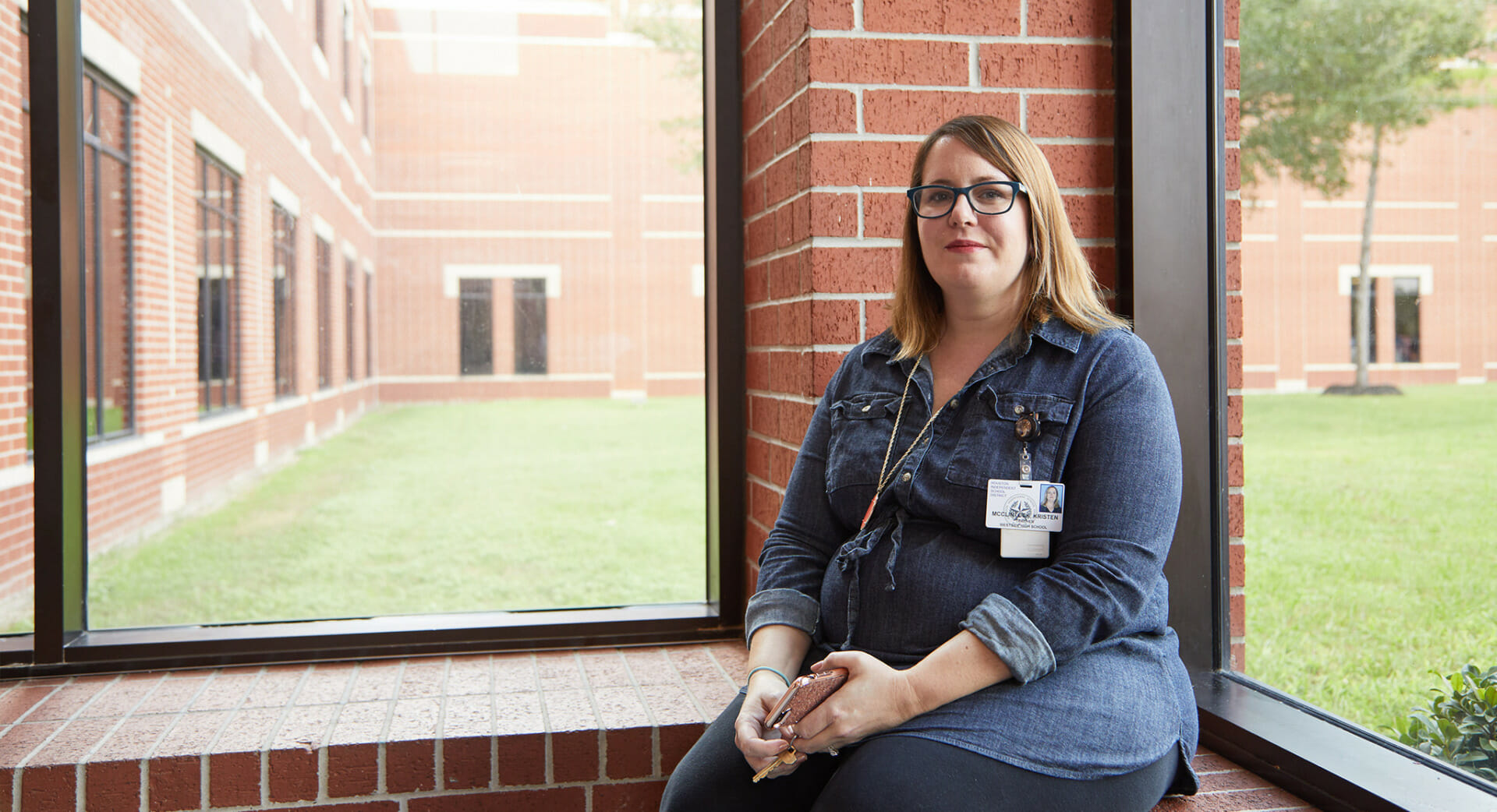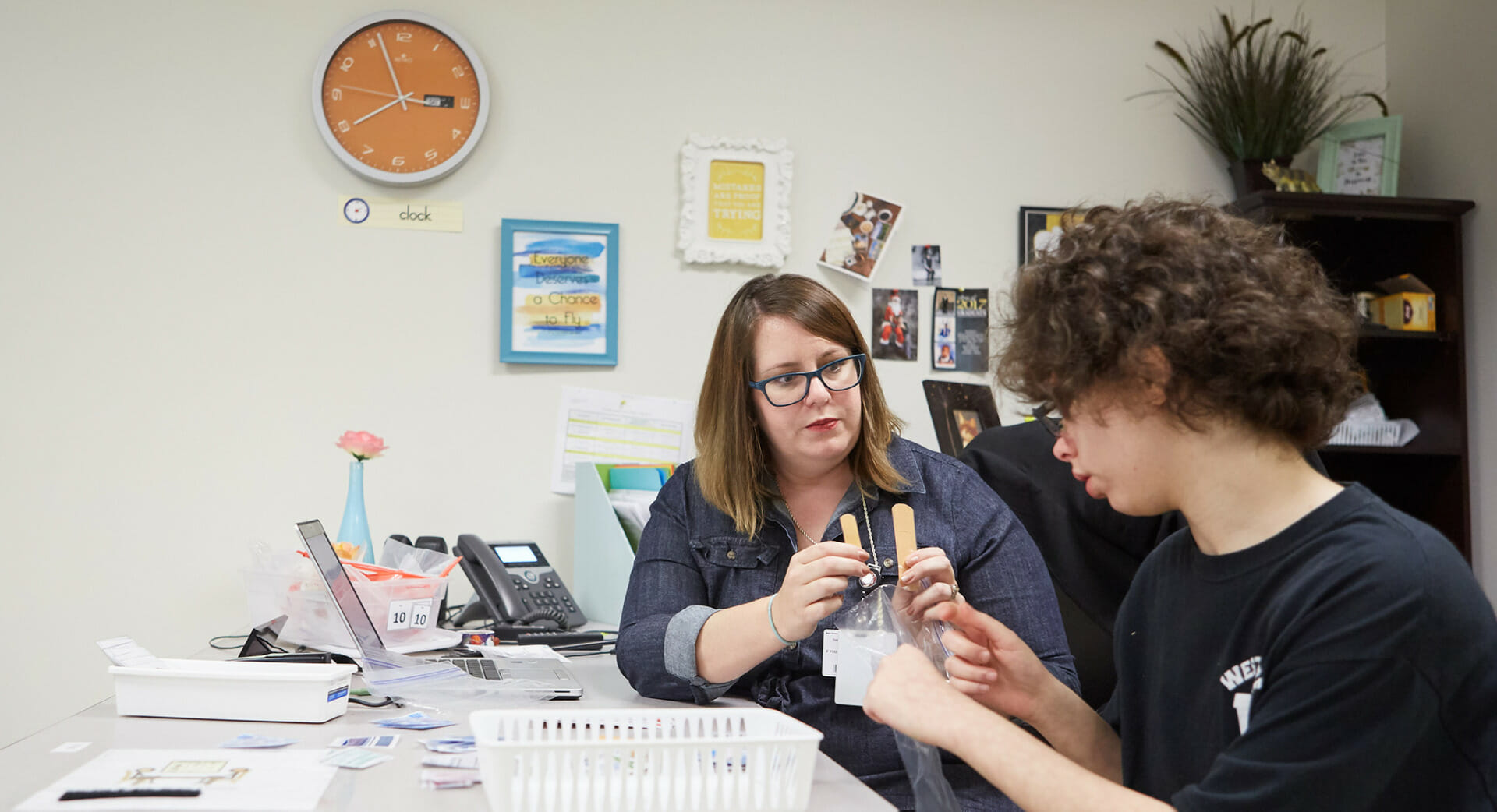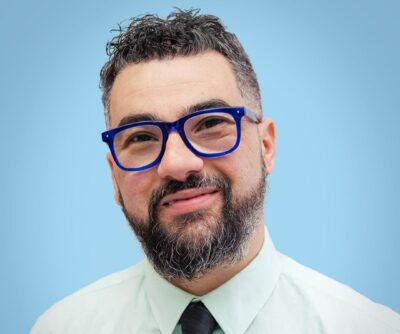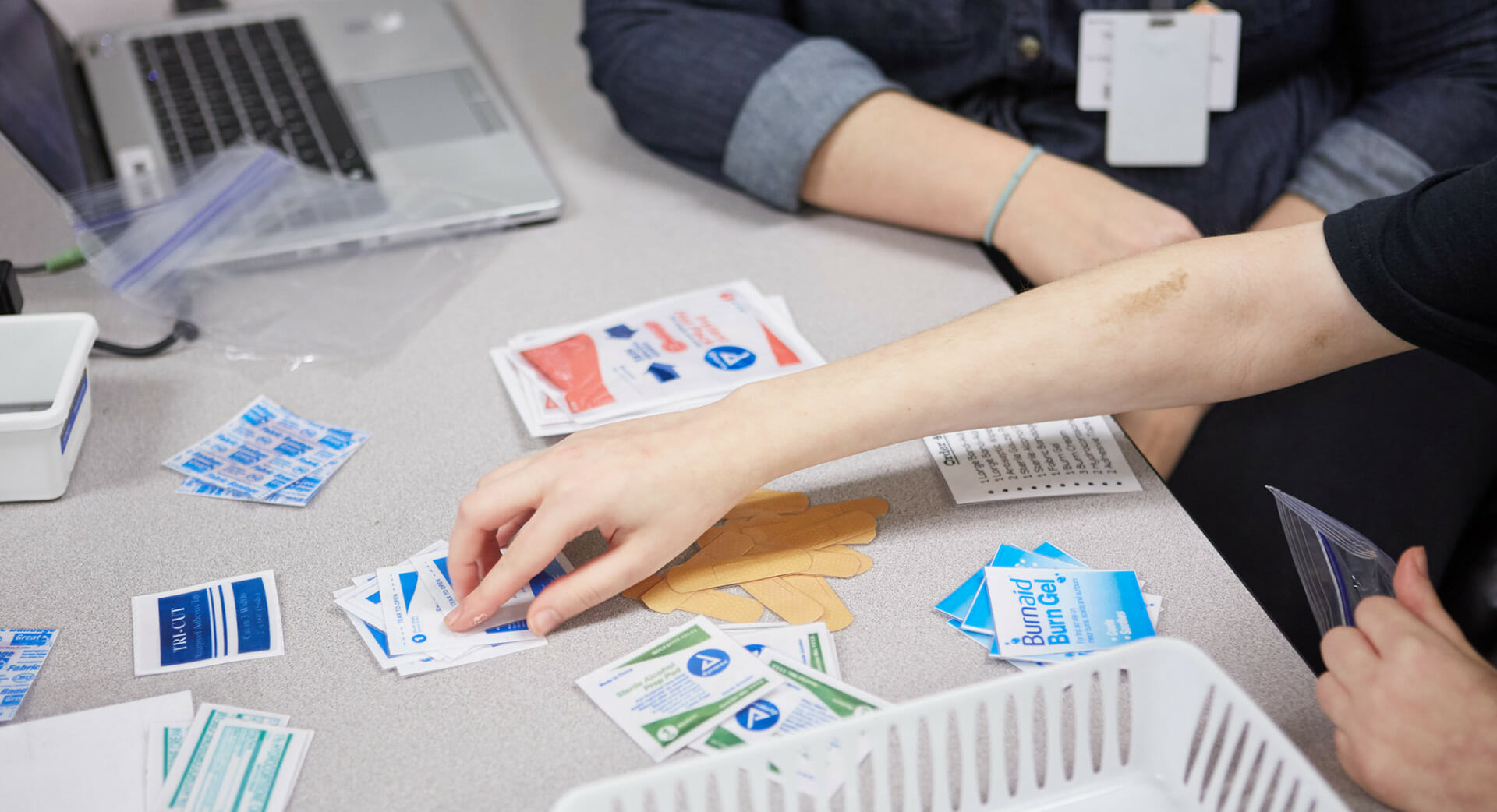November 2017 Honoree
Kristen McClintock
With her student, Emily
Westside High School, Houston, Texas
story by: Skip Hollandsworth, Executive Editor, Texas Monthly
This month's Honoree is brought to you thanks to the support of:

"Because success comes in very small steps, you must have an endless supply of patience. That’s Kristen. She fiercely loves the kids, and she will do whatever she can for them."
Deitra Ford-Robinson
It was August 29, and Hurricane Harvey had just slammed into Houston, dumping epic amounts of rain, flooding dozens of neighborhoods, and forcing nearly 10,000 Houstonians to abandon their residences and head for the George R. Brown Convention Center in downtown Houston, which had been turned into temporary shelter. One woman who arrived at the convention center was Kristen McClintock, a 35-year-old special education teacher for the Houston Independent School District. But she hadn’t been forced out of her home.
“I know there are kids here who could use my help,” she told a supervisor, who gave her a quizzical look. “Autistic kids,” Kristen patiently explained. “They have got to be terrified. They have no idea what’s happening. Let me work with them.”
Soon, word spread that a special ed teacher had set up a classroom of sorts at the north end of the convention center. Relieved parents showed up with their children, many of whom were indeed terrified by the noise and congestion and bright lights of the convention center. Others were confused, unsure what to do. They saw Kristen wearing her school badge. “Are you my new teacher?” one child asked.
Kristen quickly drew some pictures on cards – a picture of wind, another of rain, another of a home, another of the shelter itself – that gave the children a chance to understand what had happened to them and their families. Hoping to create a quiet, comforting “sensory space,” as she called it, she passed out noise-canceling headphones and earmuffs that she had bought at a dollar store. She brought along stuffed animals and such tactile toys as Silly Putty, Legos, and “bumpy balls.”
And when Kristen learned that Houston schools would not reopen for at least another couple of weeks, she and another teacher promptly started a Facebook page and a website, which they called Teachers Volunteering in Shelters, that encouraged more teachers to come work at the convention center or any of the other 200 shelters set up around the city.

Within days, close to 1,400 teachers had signed up to volunteer. They brought with them worksheets, materials for arts and crafts, even yoga mats. “We were just doing what we were called to do,” says Kristen. “We were taking care of our kids.”
It’s hard to imagine anyone more determined to take care of her kids than Kristen, who teaches 11 autistic students at Houston’s Westside High School. Now that school is back in session, she wakes up every weekday morning at 4:30 and is in her classroom promptly at 6. For the next two hours, she prepares lesson plans for each of her students. Two hours later, the students begin coming through the door – a couple escorted by their parents, a couple escorted by teacher’s aides, and a few more who show up on their own. Kristen, who’s only 5 feet 2 inches tall, makes her way around the room, giving each student a cheerful hello.
“Aidan!” she exclaims one recent morning, grinning at a 15-year-old boy who is rocking back and forth in his chair. “Hi Emma!” she says, her gaze shifting to a withdrawn 19-year-old girl who sits at her desk, writing a series of made-up words – “csswx,” “xnnht,” “ihpkkm” – in a pink notebook. “And Emily, how are you?” Kristen asks as a petite, curly-haired 21-year-old woman steps into the classroom (federal law allows special education students to attend public schools until age 23).
“Mrs. McClintock!” replies Emily, one of Kristen’s higher-functioning students, able to read at a second-grade level. “I am glad to be at school.” Suddenly, she begins straightening the chairs around the tables. She sees a pile of books on another table and straightens those too.
"I’m all about comforting kids and making them feel safe, but I still want them to learn. Learning is a behavior, no different than throwing a tantrum is a behavior."
Kristen McClintock
Teaching students with autism can be uniquely challenging. The condition can manifest in many ways – some students have trouble communicating or carrying out fundamental social skills, some engage in repetitive movements, others have emotional outbursts, and even others seem to be locked away in their own impenetrable worlds. “Teaching a classroom of autistic students, especially autistic teenagers, is unlike any other challenge in teaching,” says Deitra Ford-Robinson, a supervisor of the Houston school district’s special education program. “Because no two kids are the same, you have to take time to work with each of them, one-on-one, day after day. And because success comes in very small steps, you must have an endless supply of patience. That’s Kristen. She fiercely loves the kids, and she will do whatever she can for them.”
In 2004, while taking a psychology class as an undergraduate at the University of Houston, Kristen watched a therapist work with a hyperactive, nonverbal 4-year-old boy. By the end of the class, the therapist had him doing a puzzle. “I was mesmerized,” Kristen says. “Right then, I knew what I was going to do with my life.”
She spent 11 years with the Texas Young Autism Project, counseling autistic children. Along the way, she met special ed teachers, many of whom told her they were completely overwhelmed. “One of them said to me, ‘Kristen, there are so many kids with problems, and so little time to help them. We could use you.’ I loved my counseling job, but the more I thought about it, the more I realized teaching is where I belonged.” In 2013, after receiving her teacher’s certification, she headed to Westside High.
Since her first day in the classroom, Kristen has followed one very clear-cut rule: She does not babysit her students – she teaches them, regardless of their cognitive issues. “I’m all about comforting kids and making them feel safe, but I still want them to learn,” she says. “Learning is a behavior, no different than throwing a tantrum is a behavior.”

Every morning, the students watch a local television weather report along with a few minutes of CNN news, after which Kristen asks them questions. (“Is today going to be warm or cold?” “Should you wear a jacket tomorrow or not?” “What is the name of the state where you live?”) With the help of three teaching assistants, the students spend the rest of the morning completing simple worksheets in counting and in English. (“Circle the picture with two shirts.” “Circle the letter A.”) Kristen moves from student to student. She teaches nonverbal students to point to pictures, like a glass of orange juice or a sandwich, whenever they are thirsty or hungry. She teaches others how to write their names, tell time, and use a laptop.
Some days, she takes her entire class on field trips, always using the Houston METRO bus service. When they go to the grocery store, Kristen not only has them fill out a shopping list to buy the ingredients for a meal like cheese quesadillas but also lets them find the ingredients at the store, buy them at the checkout counter, and make sure the cashier has given them the proper change. Back in the classroom, she shows the students how to prepare the quesadillas and cook them in a microwave. “Everything we do results in some kind of lesson,” she says.
“Kristen’s strength as a teacher is that she uncovers each student’s potential – whatever that potential is,” says Gay Foust, the mother of Kristen’s student Emily. “Because of Kristen, Emily has improved by leaps and bounds. She’s gone from having no interest in reading to having a real excitement about reading. Just yesterday, for instance, as we were sitting at a stoplight, Emily read out loud the names of the businesses in a strip center. It was a huge, huge accomplishment.”
That’s not Kristen’s only success story. Over a period of several months, she was able to show Osa, another nonverbal student who constantly paced back and forth across the room, how to sit at a desk, turn on a laptop, log in, and play elementary computer games. She persuaded Quint, who’s 18, to speak without shouting at the top of his lungs. And when 18-year-old Quincey first came to her class, he would hit people as a way of greeting them. Kristen spent a year working with him, showing him videos of the appropriate way to greet someone. Today, Quincey sits happily at his desk. “Hello!” he calls out to a stranger he sees. “Hello!”

Honored gives each Honoree a $1,000 gift card to our partner, DonorsChoose.org, to help fund another teacher's important classroom need. Click the link below to see classroom projects hand-picked by our Honorees that need your support!
 Share The Love
Share The Love
"Kristen uncovers each student’s potential--whatever that potential is. Because of Kristen, Emily has improved by leaps and bounds."
Gay Foust, Emily's Mother
Even with Kristen’s support, her students continue to face many challenges: “But the fact that they are making progress means so much. Just the other day, I was working with Aiden, trying to get him to drop a domino in a bucket. Aidan’s one of my most challenging students. But out of the blue, he picked up the domino, and into the bucket it went. I wanted to burst into tears. Here is a boy with almost no motor skills, doing something no one expected him to do.”
When Kristen started at Westside High, she was told that most teachers who worked full-time with autistic students lasted three years. “And it’s been hard, there’s no question about it,” she says. Besides waking up on weekdays at 4:30 a.m., she spends her evenings on the phone, texting or talking to parents. Weekends are devoted to writing long reports on each of her students that she is required to submit to the school district. And she somehow finds time to help other special-needs families she meets – like those whose lives were drastically affected by Hurricane Harvey.
In fact, in the aftermath of Harvey, Kristen put in 18-hour days, running her classroom at the convention center and recruiting teachers to volunteer at the other shelters. She even helped set up and run a day camp for those special-needs kids who had not been forced into shelters but who needed someplace to go so their parents could take care of personal matters, like dealing with FEMA or their insurance companies. At the same time, she learned that she and her husband, a science teacher and SAT tutor, were going to have their first child. “I had my share of morning sickness,” she says. “One student, who’s usually nonverbal, saw me throw up and suddenly said, completely unexpected, ‘Mrs. McClintock is sick.’ I praised her for talking. As I mentioned, everything is a learning lesson.”
Now in her fifth year of teaching, Kristen is as energized by her work as ever. “I can’t see myself doing anything else,” she says one morning in her classroom, sitting at her desk, looking at her students. She smiles. “I feel like I could do this forever.”
Photography by Nathan Lindstrom

Stories you may like

April
Miller
George
Reavis High School
Burbank, IL

March
Lindsay
Peck
Indian Trail Elementary School
Indian Trail, NC

February
Centoria
Louden
Buena High School
Sierra Vista, AZ

April
Miller
George
Reavis High School
Burbank, IL

March
Lindsay
Peck
Indian Trail Elementary School
Indian Trail, NC

February
Centoria
Louden
Buena High School
Sierra Vista, AZ








